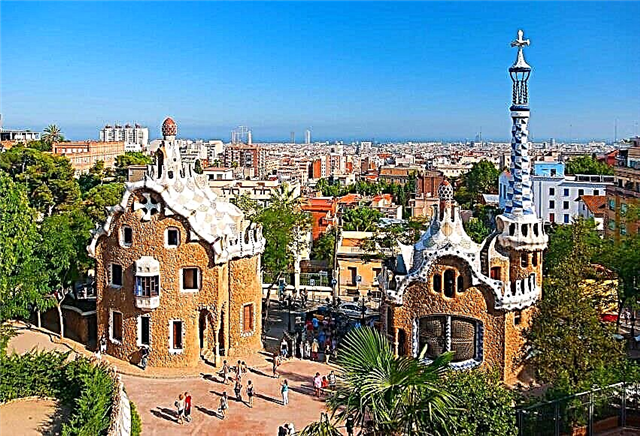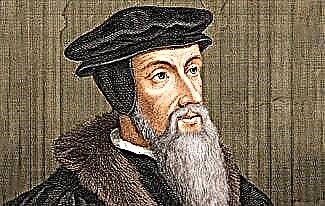Homer (9-8 centuries BC) - Ancient Greek poet-storyteller, creator of the epic poems Iliad (the most ancient monument of European literature) and Odyssey. About half of the discovered ancient Greek literary papyri are from Homer.
There are many interesting facts in Homer's biography, which we will tell about in this article.
So, here is a short biography of Homer.

Homer's biography
As of today, nothing is known for certain about Homer's life. Biographers are still arguing about the date and place of the poet's birth.
It is believed that Homer was born in the 9th-8th centuries. BC. According to various historians, he could have been born in cities such as Salamis, Colophon, Smyrna, Athens, Argos, Rhodes or Ios.
Homer's writings describe the oldest history in the world. They lack information about his contemporaries, which makes it impossible to calculate the author's life span.
Today, there are many medieval documents that describe the biography of Homer. However, modern historians question these sources due to the fact that they mention many episodes when the gods had a direct influence on the life of the narrator.
For example, according to one of the legends, Homer lost his sight after seeing the sword of Achilles. In order to somehow comfort him, the goddess Thetis endowed him with the gift of chanting.
In the poet's biographical works it is said that Homer received his name due to acquired blindness. Translated from ancient Greek, his name literally means “blind”.
It is worth noting that in some ancient books it is said that they began to call him Homer when he did not go blind, but, on the contrary, began to see. According to a number of ancient biographers, he was born to the woman Crifeida, who named him Melesigenes.

As an adult, the poet often received invitations to feasts from officials and wealthy people. In addition, he regularly appeared at city meetings and markets.
There is evidence that Homer traveled a lot and enjoyed great prestige in society. It follows from this that he was hardly the beggar wanderer that some biographers portray him as.
There is a very widespread opinion that the works of the Odyssey, Iliad and Homeric Hymns are the work of various authors, while Homer was only a performer.
This conclusion is explained by the fact that the man belonged to the family of singers. It is worth noting that at that time many professions were often passed down from generation to generation.
Thanks to this, any member of the family could perform under the name of Homer. If we assume that everything was really so, then this helps to explain the reason for the different periods in the creation of poems.
Becoming a poet
According to the historian Herodotus, Homer lived in the same house with his mother in Smyrna. In this city, he studied at the Femiya school, showing good academic abilities.
After the death of his mentor, Homer took over the leadership of the school and began teaching students. Over time, he wanted to better know the world around him, as a result of which he went on a sea voyage.
During his travels, Homer wrote down various stories, rituals and legends. Upon arrival in Ithaca, his health deteriorated. Later, he went to travel the world on foot, continuing to collect material.
Herodotus reports that the poet finally lost his sight in the city of Colophon. It was during this period of his biography that he began to call himself Homer.
At the same time, modern scientists are suspicious of the history of Herodotus, however, as well as the works of other ancient authors.
Homeric question
In 1795, Friedrich August Wolf presented a theory that became known as the Homeric Question. Its essence was as follows: since poetry in the era of Homer was oral, the blind storyteller could not become the author of such complex works.

According to Wolf, the finished form of the work was obtained thanks to the efforts of other authors. Since that time, Homer's biographers have been divided into 2 camps: "analysts" who support Wolf's theory, and "Unitarians" who say that the works belong to one author - Homer.
Blindness
Many connoisseurs of Homer's work deny his blindness. They argue that at that time the sages were often called blind in the sense that they were deprived of ordinary sight, but knew how to look at the essence of things.
Thus, the word "blindness" was synonymous with wisdom, and Homer was indisputably considered one of the wisest people.
Artworks
The surviving ancient scrolls say that Homer was practically an omniscient person. His poems contain information concerning all areas of life.
An interesting fact is that Plutarch stated that Alexander the Great never parted with the Iliad. And according to the "Odyssey" in Greece, children were taught to read.

Homer is considered to be the author not only of the Iliad and the Odyssey, but also of the comedy Margit and Homeric Hymns. He is also credited with a cycle of works: "Cypriot", "Taking Ilium", "Ethiopis", "Small Iliad", "Returns".
Homer's writings are distinguished by a unique language that is unlike the works of other authors. His manner of presenting the material is not only interesting, but also easily assimilated.
Death
According to one of the legends, shortly before his death, Homer went to the island of Ios. There he met two fishermen who asked him the following riddle: "We have what we did not catch, and what we caught we threw away."
The sage plunged into long thoughts, but could not find an answer. As it turned out, the boys were catching lice, not fish.
Homer was so upset about not being able to solve the puzzle that he slipped and hit his head.
Another version says that the poet committed suicide, since death was not as terrible for him as the loss of mental acuity.
Homer Photos












